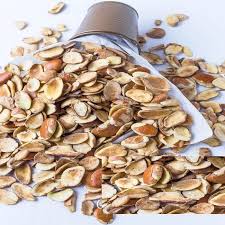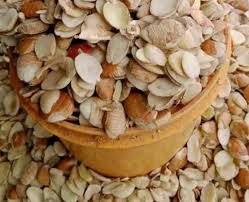There is a considerable amount of information on the markets for Irvingia gabonensis in southern Nigeria. In some areas there is such high demand for this product that it has become a luxury item. Its major market is in rural southern Nigeria.
Marketing of Irvingia sp. involves producers (principally men), processors (principally women), and wholesale and retail traders (generally women). The Department of Forest Resource Management (1986) notes that market prices are usually controlled by wholesale traders, but that for distant markets retail traders have greater control over prices.
Households are reported to devote, on average, between 2% and 5% of their annual expenditure on Irvingia gabonensis products. It is estimated that there is a demand for 78.8 million kilogrammes of Irvingia sp. per year; and that 80% of this demand is in the southern parts of Nigeria.
The consumption of Irvingia gabonensis seeds is limited by supply, and in urban areas, by high prices (Department of Forest Resource Management, Nigeria 1986).
Read Also: Ways of Tackling Deforestation Problems
Agbor (1986) conducted an extensive study of Irvingia gabonensis marketing and production. There are two varieties of Irvingia sp., one produces a sweet fruit and is generally consumed raw, the other is a bitter variety exploited for its seed. Agbor found that there was a greater demand for the bitter variety.
The prices for seeds and fruit were lower in the rainy season, and in all cases considerably more expensive in non-producing districts. He found that there was great variation in the density of trees in different southern districts ranging from an average 87 trees per farmer in Ogoja district to an average two trees per farmer in Ikono district.
Tree density corresponded to variations in land availability: higher tree densities reflected less land pressure. Irvingia gabonensis provided an important source of income for many farmers (see also Section 5.3).
In southwestern Cameroon, Irvingia gabonensis fruit and seed are also commonly marketed. In the Korup region they are often gathered, dried and sold to Nigerian traders or taken to Nigerian markets (where one bucket fetches approximately FCFA 10,000) (Gartlan 1987, Department of Forest Resource Management 1986).
Related: 50 Business Ideas for Aspiring Entrepreneurs on Agriculture

Irvingia gabonensis is one of the most important indigenous fruit trees cultivated and commercialized in Edo Central, Nigeria. In this study, the yields of fruits and seeds of Irvingia gabonensis were evaluated in traditional agro forestry and compound farming systems.
The results showed that the mean fruit yield of the species are 620 and 850 fruits/tree while the projected mean fruit productions/hectare are 76,880 and 105,400 fruits in the two systems respectively. Mean seed yield of 18.24kg and 25kg of dry cotyledon per tree was recorded with a projected cotyledon yields/hectare of 2,262 kg/ha and 3,100 kg/ha respectively.
In the open market, 50g of dry cotyledons of the species sells for N 170.00, while average farmers income from fruits production of the species per household is about N 3,675.00 annually.
Irvingia gabonensis and I. wombulu; the bush mango are the sources of ‘Ogbono’ , the Irvingia kernel which is popularly used as soup thickener in most West African countries.
Less than 10% of the total annual crop of the fruit or the kernel is harvested from planted trees while the rest are collected from natural forests. Harvesting or collections in the forests are activities of women and children. They are also responsible for processing and substantial amount of marketing.
Irvingia kernel is now major export produce to Europe and the USA. The popularity of Irvingia kernels in the local and international markets has given it the potentials for a true commercial crop, with this resulting in more intensive collection in the forests.
Recently, an attempt at setting local quality standards for the kernels in trade has commenced. Standardization of this will help export promotion and the increase of financial returns to the rural farmers who collect from the forests and manually process (nut extraction) and sun dry for storage before marketing.
The various initiatives of ICRAF, NACGRAB and CENRAD on the collection of the remaining genetic resources of Irvingia in West Africa, its establishment in genebanks and the potentials to utilize selected lines in new planting provides hope for the future. It is believed that this will provide the seed for the sustainable production of Irvingia as deforestation and old tree age is already affecting wild resources.
Pure stand plantations and trees in agroforestry systems are attractive. Multistrata agroforestry system for production is presently being established in Nigeria within the southern forest zones where bush mango is well known.
Related: The History and Spread of Cultivated Crops


This site is good for farmers to upgrade themselves in this information age.
Thank you so much and Glad we could help… Smiles